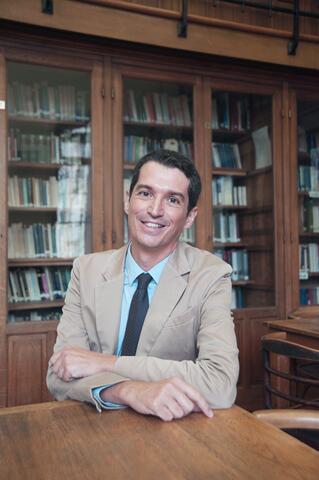
Alessandro Garcea
Director of the Sciences of Antiquity Initiative
Statistics show that interest in classics and ancient civilizations remains strong.
Deputy Director of the Latin Institute and Director of the Science of Antiquité Initiative at Sorbonne University, Alessandro Garcea builds bridges between the centuries. From Turin to Paris, his career reflects his commitment to redefining the study of antiquity for future generations. By exploring the intellectual debate around the Latin language and integrating advances in digital humanities, he has a bold vision for antiquity, rooted in the past and resolutely looking to the future.
Immersed in ancient civilizations from his early teens, Alessandro Garcea spent five years studying Greek and Latin at the Italian Classical High School. "Initially, I wanted to study science, but the discovery of Greco-Roman civilizations and direct contact with the texts really fascinated me", he recalls. He then embarked on a traditional course of study in Classics, with a strong emphasis on philosophy, at the University of Turin. This convergence of language and philosophy defined his intellectual identity, marking the beginning of an exploration of the linguistic thought of the Ancients in its historical and cultural context. During his doctorate, which focused on the relationship between language and emotion in ancient texts, he concentrated in particular on Cicero's correspondence, which reveals the literary subtleties of emotional expression.
After completing his thesis, Alessandro Garcea returned to France and the Université Paris 7 as a visiting researcher in the Laboratoire d'Histoire des Théories Linguistiques where he deepened his expertise in ancient Greek and Roman grammar. He then moved to Toulouse 2 University where, for six years, he found fertile ground for his research. In 2009, he was appointed Professor of Latin Linguistics at Lyon 2. Four years later, he joined the Faculty of Letters at Sorbonne University, becoming deputy director of the "Ancient and Medieval Worlds" doctoral school in 2018, and of the only training and research unit devoted exclusively to Latin in France, in 2023.
Languages still relevant today...
“Statistics show that the student community is still keenly interested in Classics and ancient civilizations," he explains, "but this requires constant reflection to adjust programs to the needs of people who are no longer destined solely for teaching. The study of Latin and its audiences are evolving rapidly. We have students in classics, modern literature, history and philosophy, but also other groups interested in Latin with specific needs, for whom we need to design adapted courses wherever possible".
Alongside his teaching responsibilities, Alessandro Garcea plays a central role in the "Rome and its Renaissance" research team and in the Sciences de l'Antiquité Initiative (ISAntiq) at Sorbonne University. This ambitious initiative, which he has been leading for the past four years, aims to unite our University's vital forces around the study of antiquity in literature, philosophy and archaeology, as well as through the study of manuscripts, papyri and coins. "One of Isantiq's major challenges has been to create an interdisciplinary community, to give a clear identity to the study of antiquity within our University, taking into account the many facets of this universe. This has led to the design of training courses that encourage an interdisciplinary approach, particularly at master's and doctoral levels," he explains. Praised by Sorbonne Université, the Initiative will even be renewed as an Institute in 2025, a testament to its success and growing impact.
Qu'est-ce que l'Initiative Sciences de l'Antiquité ?
... at the heart of his research
His research focuses on the intellectual debate on the Latin language that took place in three different eras: Republican, Imperial and Late. Alessandro Garcea points out that, at university level, we can't distinguish between research and teaching, insofar as research feeds our teaching, which in turn must take into account the evolution of the discipline".
Through the LiTeRa project, funded by the European Research Council, he is resurrecting the fragmentary voices of the past, revealing the genesis of the linguistic debates that have shaped Western culture. The corpus, ranging from the 3rd century BC to the 3rd century AD, is made up of around 100 fragmentary texts on the Latin language: "excerpts from texts written by unknown authors, but also by leading figures in Rome, such as Julius Caesar, himself the author of a treatise on the Latin language, of which we have edited around 20 fragments", explains the researcher. To overcome the problems associated with traditional paper editions, Alessandro Garcea is using the methods and tools of digital humanities in this large-scale project. Working with experts in the field, he aims to build a computerized corpus to recontextualize the fragments in all their complexity, enabling a richer, more nuanced understanding of ancient works.
His research also opens up new perspectives for the teaching of ancient languages, as "these founding texts of Latin grammar are also the founding texts of the grammar of today's Western languages". They also shed light on contemporary linguistic debates, such as the question of gender, which the Romans had already addressed by distinguishing, in the Latin language, between natural gender and grammatical gender.
Through his work, Alessandro Garcea embodies a modern vision of the sciences of antiquity, highlighting aspects that are often neglected, such as bilingualism and multilingualism, which were very much in evidence during this period. For him, Antiquity rhymes with plurality and diversity. "It's important to broaden the traditional vision of Antiquity to defend a dynamic and inclusive approach that takes into account its linguistic, cultural and historical complexity, going beyond the classics of Latin literature", he asserts. It is in this perspective that Alessandro Garcea aspires to educate a new generation of researchers to engage in this global understanding of antiquity capable of illuminating contemporary issues through the prism of the past.
Découvrez également l'Ecole des langues anciennes de Sorbonne Université
Présentation de l’École des langues anciennes de Sorbonne Université
